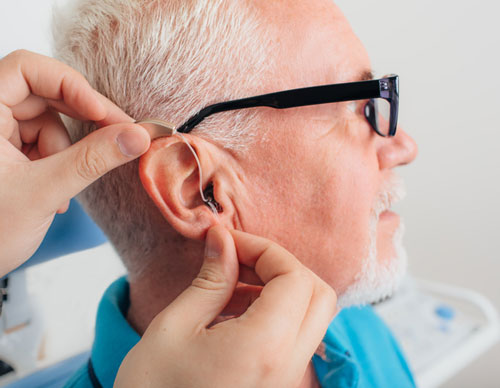When your hearing starts going, it’s more than just a matter of not being able to hear people or needing to turn up the volume on the TV.
Studies have established that hearing loss affects you in other ways. It is strongly linked to dementia, anxiety, depression, falling, and problems walking.
Now, new research has found a simple way to lower your risk of having these issues.
The study was published in the Journal of the American Geriatrics Society. Researchers looked at about 115,000 hearing-loss patients over age 66. They tracked the patients’ health from one year prior to diagnosis to three years afterward.[1]
There were big differences between the medical issues of patients who wore a hearing aid compared to those who didn’t.
Hearing aid use reduced the risk of:
- Dementia by 18%.
- Fall-related injuries by 13%.
- Depression or anxiety by 11%.
Doctors speculate that poor hearing means less stimulation for the brain. That in turn could lead to cognitive decline.
Deafness is a common ailment. About 25% of the U.S. population ages 65 to 74 has disabling hearing loss. Over the age of 75, 50% have it.[2]
Dr. Elham Mahmoudi led the study. He said correcting hearing loss “is an intervention that has evidence behind it.” He hopes doctors and patients understand the link between having a hearing aid “and other aspects of their health.”[3]
Just 12% of people diagnosed with hearing loss use a hearing aid.
Many people avoid hearing aids because they don’t want to admit that they are old enough to need them. Or they put off getting them because of the expense or out of vanity.
The new research shows that’s a bad idea.
6 Must-Have Hearing Aid Features
There are so many hearing aids on the market, it’s hard to know where to start when shopping for them. Here are six things you should look for when buying…[4]
- Advanced microphones. These “smart” microphones will reduce ambient noise while amplifying the sounds you want to hear…people speaking to you, the TV, radio, etc.
- Rechargeable batteries. Lisa Christensen is the president of the American Academy of Audiology. She recommends hearing aid batteries that you can charge at night and then wear for 16 hours the next day.
- Smartphone connectivity. With this, you can hear phone calls and music streamed from your cell phone or computer.
- Automatic noise adjustment. This allows the hearing aid to adjust to the room’s noise level…whether you’re in a very quiet or very loud area or anything in between.
- Tinnitus masking. Many people experience some level of tinnitus or chronic ringing in the ears. This feature produces soothing sounds to mask it.
- Multiple programs. These set the sensitivity of your hearing aid based on the environment…outdoors on a windy day versus indoors in a small or cavernous room.
If you have poor hearing, the most important thing is to get hearing aids, no matter what kind they are. Your life—and your health—will improve when you can clearly hear what’s going on around you.
Editor’s Note: Discover other natural, nondrug methods to improve your health by reading Independent Healing. It’s your best source for unbiased, evidence-based health information. To find out how to subscribe, go HERE.
Related Articles
Pain Relievers Can Damage Your Hearing, Study Finds
Trouble Hearing? You May Lack One Mineral
Like this Article? Forward this article here or Share on Facebook.
[1]https://www.ncbi.nlm.nih.gov/pubmed/31486068
[2]https://www.nidcd.nih.gov/health/statistics/quick-statistics-hearing
[3]https://www.medicalnewstoday.com/articles/326340.php
[4]https://www.consumerreports.org/hearing-aids/sound-advice-about-hearing-loss/

